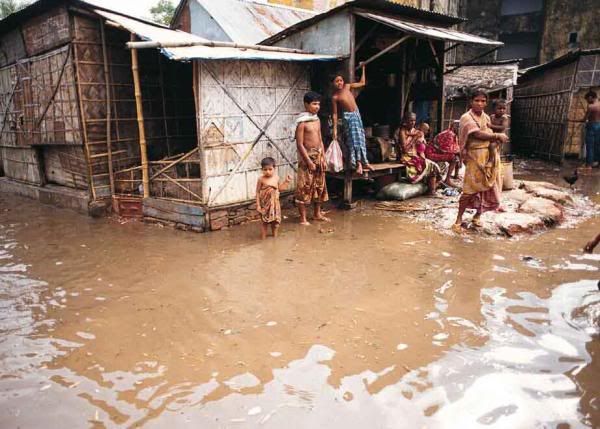Climate change may devastate Asian economies, create millions of environmental refugees

Because of their reduced CO2 emissions, biofuels and bioenergy can play a crucial role in fighting climate change. The urgency of combating this biggest of all threats is confirmed once again by yet another scientific report which shows the potentially enormous economic and social damages caused by climate change in the near future across Asia and the Pacific.
The picture looks grim: millions of people could become homeless in the Asia-Pacific region by 2030 due to rising sea levels, with Bangladesh, India, Vietnam, China and Pacific islands most at risk, says Australia's top scientific body. The spread of tropical diseases, collapsing economies and an increase in the occurence of devastating extreme weather events would also become a reality.
Sea level rises
The climate change report by the Commonwealth Scientific and Industrial Research Organisation (CSIRO) found global warming in the Asia Pacific region could cause sea levels to rise by up to 16 cm (six inches) by 2030 and up to 50 cm (19 inches) by 2070. Rising temperatures will also result in increased rainfall during the summer monsoon season in Asia and could cause more intense tropical storms, inundating low-lying coastal villages.
"The coastlines of Asia-Pacific nations are generally highly vulnerable to the effects of climate change, particularly sea-level rise caused by rising global temperatures," said the CSIRO report released on Monday. "Vast areas of the Asia-Pacific are low lying, particularly the small-island states, as well as the large river deltas found in India and Bangladesh, Southeast Asia and China."
Sea level rise between 30 to 50 cm (11 to 19 inches) would affect more than 100,000 km (62,140 miles) of coast, particularly China's Pearl Delta and Bangladesh's delta, said the report. "As sea level rise exceeds half a metre, the area affected in the Asia-Pacific region rises to over half a million square kilometres, affecting hundreds of millions of people," it said. "Large areas of Bangladesh, India, Vietnam are inundated and Kiribati, Fiji and the Maldives are reduced to just a small fraction of their current land area."
Disease, collapsing economies, environmental refugees
The report also said rising sea levels and increased rainfall would spread infectious diseases in the region, leaving millions more at risk of dengue fever and malaria. It said local and regional economies would be hard hit by chronic food and water insecurity:
 bioenergy :: biofuels :: energy :: sustainability :: climate change :: global warming :: CO2 :: Asia-Pacific :: environmental refugees ::
bioenergy :: biofuels :: energy :: sustainability :: climate change :: global warming :: CO2 :: Asia-Pacific :: environmental refugees :: As an example the report shows that Sri Lanka's GDP could fall by 2.4 percent with less than a two degree Celsius warming. The report also warned of environmental refugees fleeing their flooded homelands, citing growing migration from some South Pacific island states already suffering rising sea levels.
Some 17,000 islanders applied for New Zealand residence in the last two years, compared with 4,000 in 2003, it said. The low-lying South Pacfic island nation of Micronesia has experienced an annual sea level rise of 21.4 mm since 2001.
The report, commissioned by Australian aid agencies, prompted calls for Canberra to do more to combat climate change and to be more open to environmental refugees.
Kyoto and biofuels now
Australia has not signed the Kyoto Protocol to cut greenhouse gases, which cause global warming, and has rejected requests from Pacific islands to take environmental refugees. World Vision Australia chief, Reverend Tim Costello, called on Australia to review immigration programmes to consider people displaced by rising sea levels.
"This is enlightened self-interest, because there are going to be so many environmental refugees knocking on our door, flooding here with the sea levels rise as predicted and...the failure of economics and crops because of the rain changes in so many of these countries," Costello told local radio.
More information:
Reuters: Rising seas could leave millions homeless in Asia - Oct. 9, 2006
International Herald Tribune: Climate change may devastate Asian economies, increase disease risk, researchers say - Oct. 9, 2006
 -------------------
-------------------
 Spanish company Ferry Group is to invest €42/US$55.2 million in a project for the production of biomass fuel pellets in Bulgaria.
The 3-year project consists of establishing plantations of paulownia trees near the city of Tran. Paulownia is a fast-growing tree used for the commercial production of fuel pellets.
Spanish company Ferry Group is to invest €42/US$55.2 million in a project for the production of biomass fuel pellets in Bulgaria.
The 3-year project consists of establishing plantations of paulownia trees near the city of Tran. Paulownia is a fast-growing tree used for the commercial production of fuel pellets.









0 Comments:
Post a Comment
Links to this post:
Create a Link
<< Home